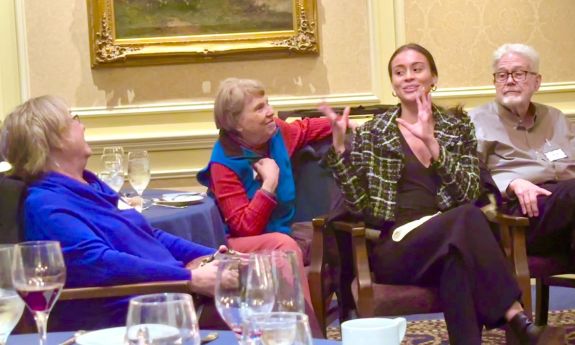Duke Retirees and Alumni Keep Learning With OLLI
Program connects thousands of community members to lifelong learning at Duke

Among OLLI’s latest classes is “What Might Have Been,” taught by Duke professor emeritus of history William Chafe. It examines scenarios of how history might have changed if, for example, President John F. Kennedy had not been assassinated.
One of Chafe’s students is Ellen Luken, a Fuqua School of Business alumna who worked for 44 years at Duke’s medical center before retiring in 2020. Luken is also taking OLLI classes this session on astrophysics, justice, Russian history and the history of tea -- the last taught by Margaret Brill, a retired specialist in British history at Perkins Library.
“OLLI allows us to continue our curious, engaged intellectual lives.”
Dr. Carol Hamilton
“My retirement life has been enriched by OLLI,” Luken says.
She’s not alone. Hamilton says her earlier course about COVID helped her stay connected during the pandemic with her former colleagues in the Duke Infectious Diseases group.
“I was able to call on several faculty members to give a real-time, first-hand account of what had just happened, and where things were headed,” Hamilton says. “The speakers were highly credible and happy to share their experiences.”
Hamilton doesn’t only teach OLLI classes; she takes them herself, including one about the periodic table where her classmates ranged from retired chemists to literature majors and history buffs.
“People take classes about subjects they have always been interested in, but either didn’t have time to delve into or thought might be too difficult,” Hamilton says. “OLLI allows us to continue our curious, engaged intellectual lives.”
She cites a friend, a former Duke physician, who “has published three books because of a writing class he started taking at OLLI upon his retirement.”
“For me, it's all about the freedom to learn anything,” says Bobbie Hendrix, who heads OLLI’s advisory council. “I have begun a new hobby, on genealogy, and learned things I'm not good at, such as German philosophy and calligraphy. Even in classes that don't spark a new path in learning, I’ve gained new knowledge and made new friends.”
Like Luken, Hamilton and many of OLLI’s other volunteer leaders, Hendrix has deep Duke ties. She came to the university in 1972 and retired more than 42 years later as the director of clinical risk management. She then served on the Duke Health Board of Governors and the county board that oversees Duke Regional Hospital. “I began my first OLLI classes in the first month after I retired,” she says. “It’s been a unique bridge to a new phase of life.”
“The essence of OLLI is the community of learners it creates. ... It’s a great example for others interested in lifelong learning about how to create community effectively.”
Ted Segal
Alan Teasley taught in the Durham Public Schools and directed Duke’s Master of Arts in Teaching program. Now retired, his classes on Broadway musicals have become OLLI favorites, including his current class on composer Stephen Sondheim.
“OLLI has developed the infrastructure to offer courses of wide interest to retirees. As a 75-year-old myself, I don’t have access to such a variety of courses, both in person and online, without paying a lot of money,” Teasley says. His OLLI course costs $110 for ten sessions, which is typical.
One of Teasley’s previous OLLI students was Ted Segal, who took Teasley’s course on Leonard Bernstein. Segal is an active Duke alumnus and author of “Point of Reckoning,” a book about Duke's racial history in the Sixties.
“The essence of OLLI is the community of learners it creates. I think being a part of this community has immense benefits to OLLI members,” Segal says. “It’s a great example for others interested in lifelong learning about how to create community effectively.”
Segal and others also cite OLLI’s ties with the wider community, such as through classes on Durham history, joint projects with local organizations and a program through which OLLI members volunteer with local nonprofits.
Hendrix calls OLLI a “gateway” to Duke and Durham for its many members who relocated to the area after retiring. “With projections for the Triangle’s 50+ demographic increasing, OLLI is seeing an influx of new members while expanding its outreach to retirees and alums both locally and nationally,” she says.
Donna West is among the growing number of Duke alumni participating from afar, taking OLLI online classes from her Cincinnati home on topics ranging from philosophy to international relations -- quite different from what she studied in Duke’s nursing school.
“For me, OLLI at Duke has been a dream come true,” she says. “The class discussions have been enlightening, engaging and rigorous. From my first class, I knew I had found my intellectual home.”
David Jarmul, Duke’s former head of news and communications, has taken OLLI classes on diverse topics and volunteers through OLLI with the West End Community Foundation.